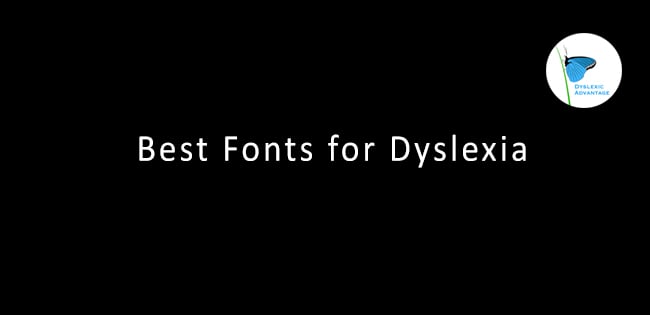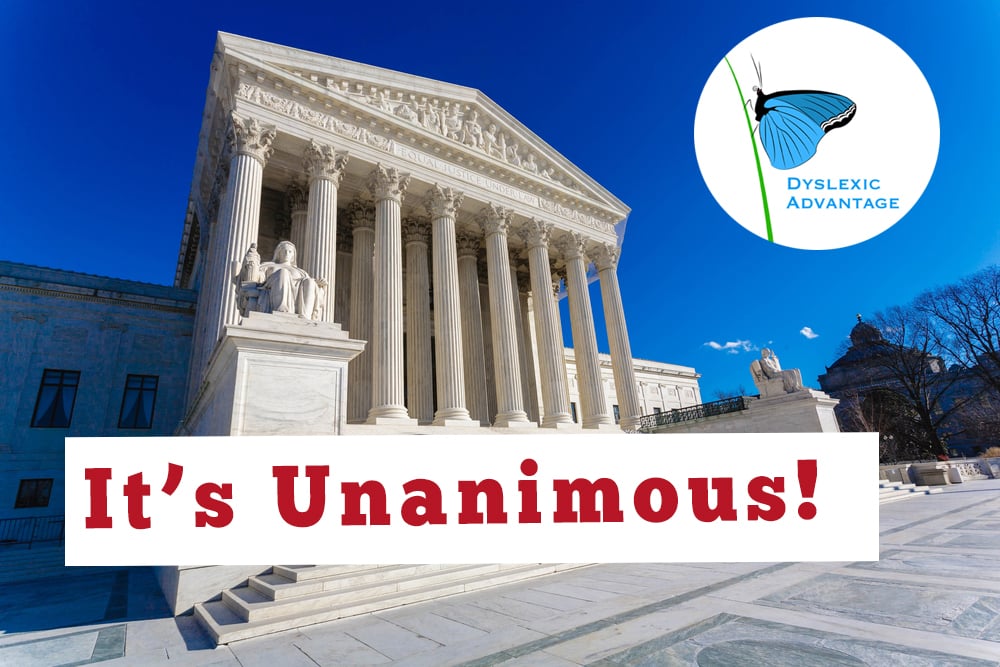FIGHTING FEBRUARY BLUES There are seasonal issues that can make February an especially difficult month for everyone. The holiday rush and start of the new term are over, the daylight hours are shorter, and midterms are looming large. Work may pile up as students fall increasingly behind. They may no longer have the positive input or feedback that good parents may have provided when they were younger. Seasonal Affective Disorder is fairly common. Symptoms of seasonal affective disorder tend to begin in the teen to early adult years and affect 5-10% of the population. Symptoms may include: increased feelings of stress or anxiety, oversleeping, lowered mood, more irritability, appetite changes, changes in school performance. If students are away at college or if adults work in […]
The Best Fonts for Dyslexia
With increasing awareness of the visual differences associated with dyslexia and the high incidence of dyslexia in the general population (15-20%), the world seems poised to change how they present print to dyslexic readers. What fonts are best for dyslexic...
Calculator Use: Accommodation or No?
A teacher writes, "I have a new student who transferred from a public charter school. She has an IEP accommodation for a calculator use for anything involving math calculations. But I'm wondering whether providing a calculator is changing standards? Is she learning...
Dyslexia-FRIENDLY Foreign language Instruction [PREMIUM]
Because dyslexia has significant challenges that make foreign language learning difficult (e.g. impaired phonemic awareness, limitations on auditory verbal working memory, weak rule-based memory and syntax, etc.), many students request and are granted foreign language waivers. That being said, there are many students who can do well at foreign language learning, and alternative classrooms should be considered in order to help more students achieve proficiency in a second language. From Dr. Jonathan Arries: “Studies suggest that students with LDs may experience difficulties with the following tasks: 1) imitation and differentiation of vowel sounds 2) orthography 3) vocabulary acquisition 4) comprehension and memory of spoken instructions 5)reading comprehension passages 6) comprehension of written instructions 7) application of grammar rules taught inductively….Javoarsky, Sparks, and Ganschow indicate some […]
[PREMIUM] TEST-TAKING: DYSLEXIA and MULTIPLE CHOICE
At the secondary and university level, many students with dyslexia may prefer short answer questions to multiple choice. There are many reasons why the multiple choice question format may not be a good estimator of a student’s knowledge. It is very common for the questions and choice answers to be ambiguous. From Biochemical Education: “Writing good multiple choice questions is hard, a fact not appreciated by all teachers and examiners. There is a tendency to use imprecise terms, and even when apparently precise terms such as always and never are used (for example in true/false type tests), it seems that not everyone agrees these are indeed absolutes….In a survey of medical examiners, Holsgrove and Elzubeir found that of 63 respondents, 51 considered that always means […]
How to Teach Dyslexic Students Geography [PREMIUM]
Many people may not know that a dyslexic scientist (Dr. Wally Broeker) led the first research team characterizing the Great Ocean Conveyor Belt – a massive cycling that takes place in the world’s oceans that circulates the sun’s heat around the globe and also has profound effects on marine animal migration and climate. Although the subject of Geography should be a natural fit for many dyslexic students with its high demands on MIND strengths (material, interconnected, narrative, and dynamic reasoning), it can also be taught in rote fashion (memorize map names and features) that can lead many students to struggle. In at least one study, dyslexic students being taught geography learned significantly better than their non-dyslexic counterparts if they were taught using multimedia (text, graphics, and sound). Multimedia was […]
This Secondary School Developed a Comprehensive Plan to Help All DYSLEXIC Students
Here's one remarkable school decided to go 'all in' to help a dyslexic high school student who seemed to be slipping away. Matthew was a rising 10th grader at a non-selective high school. The majority of students at the school were described as being of low...
Dyslexia at Work: Say This, Not That
Academic studies of dyslexia in the workplace have all arrived at the same conclusion: the vast majority of adults with dyslexia choose not to disclose or ask for accommodations in the workplace. Of those who do disclose, they often disclose to some but not all of...
Dyslexic Master Montessori Teacher ALISON AWES [Premium]
I recently had a chance to talk with Master Montessori Teacher Alison Awes who is based at the Montessori Training Center of Minnesota. Alison is dyslexic herself and she has written about how Montessori instruction can support dyslexic students. Alison is also trained in Orton-Gillingham Level1. Like the Orton-Gillingham method, the Montessori approach was created by a physician working with special education students. I knew about Montessori because both our children attended Montessori preschools and we liked many aspects of the educational approach, including self-directed learning, multi-age classrooms, and well-designed hands-on materials. I was interested in hearing about Alison’s experiences because she attended a Montessori school herself until the age of 12 and then transitioned to a traditional middle school. She only discovered that she […]
Surviving IEP Season [Premium]
IEP season usually runs from late March through early June, and it’s a time when parents and teachers meet with the IEP team to assess the past year’s progress and also plan for changes that should take place for the upcoming year. Be aware, too, that we have a new Supreme Court decision that is holding school districts accountable. Here is an important excerpt from the Endrew F. vs. Douglas County School District decision: “The IEP must aim to enable the child to make progress. After all, the essential function of an IEP is to set out a plan for pursuing academic and functional advancement… When all is said and done, a student offered an educational program providing ‘merely more than de minimis’ [trivial or […]
GREAT Supreme Court Decision – Schools Must Provide More Support for Students with Disabilities
A GREAT Supreme Court Unanimous (8-0) was handed down that states that public schools must provide more than 'de minimus' or the bare minimum to benefit students with disabilities. The fact that some school systems (in this case, Douglas County) were fighting the...
Let Them Listen – Audiobooks and Dyslexia [Premium]
Let Them Listen! “The objective of the present research study was to understand what benefits the use of audiobooks (both school-books and books of various genres, recorded on digital media) could bring to preadolescents and adolescents with developmental dyslexia. Two groups, each consisting of 20 adolescents, were compared. The experimental group used the audiobooks, while the control group continued to use normal books. After 5 months of experimental training, the experimental group showed a significant improvement in reading accuracy, with reduced unease and emotional–behavioural disorders, as well as an improvement in school performance and a greater motivation and involvement in school activities.” – Milani et al., Dyslexia (journal) It’s surprising how often we continue to hear that dyslexic students are denied the use of audiobooks […]

![Fighting February Blues [Premium]](https://www.dyslexicadvantage.org/wp-content/uploads/2018/02/shutterstock_387009517.jpg)


![Dyslexia-FRIENDLY Foreign language Instruction [PREMIUM]](https://www.dyslexicadvantage.org/wp-content/uploads/2018/01/Screen-Shot-2019-08-30-at-12.47.29-PM.jpg)
![[PREMIUM] TEST-TAKING: DYSLEXIA and MULTIPLE CHOICE](https://www.dyslexicadvantage.org/wp-content/uploads/2017/12/shutterstock_1153156547.jpg)
![How to Teach Dyslexic Students Geography [PREMIUM]](https://www.dyslexicadvantage.org/wp-content/uploads/2017/10/Screen-Shot-2019-08-31-at-5.21.43-PM.jpg)


![Dyslexic Master Montessori Teacher ALISON AWES [Premium]](https://www.dyslexicadvantage.org/wp-content/uploads/2017/09/Screen-Shot-2019-08-31-at-4.00.40-PM.jpg)
![Surviving IEP Season [Premium]](https://www.dyslexicadvantage.org/wp-content/uploads/2017/05/Screen-Shot-2017-05-30-at-9.53.04-AM.png)

![Let Them Listen – Audiobooks and Dyslexia [Premium]](https://www.dyslexicadvantage.org/wp-content/uploads/2017/02/reading-audiobooks-our-shutterstock-scaled.jpg)













